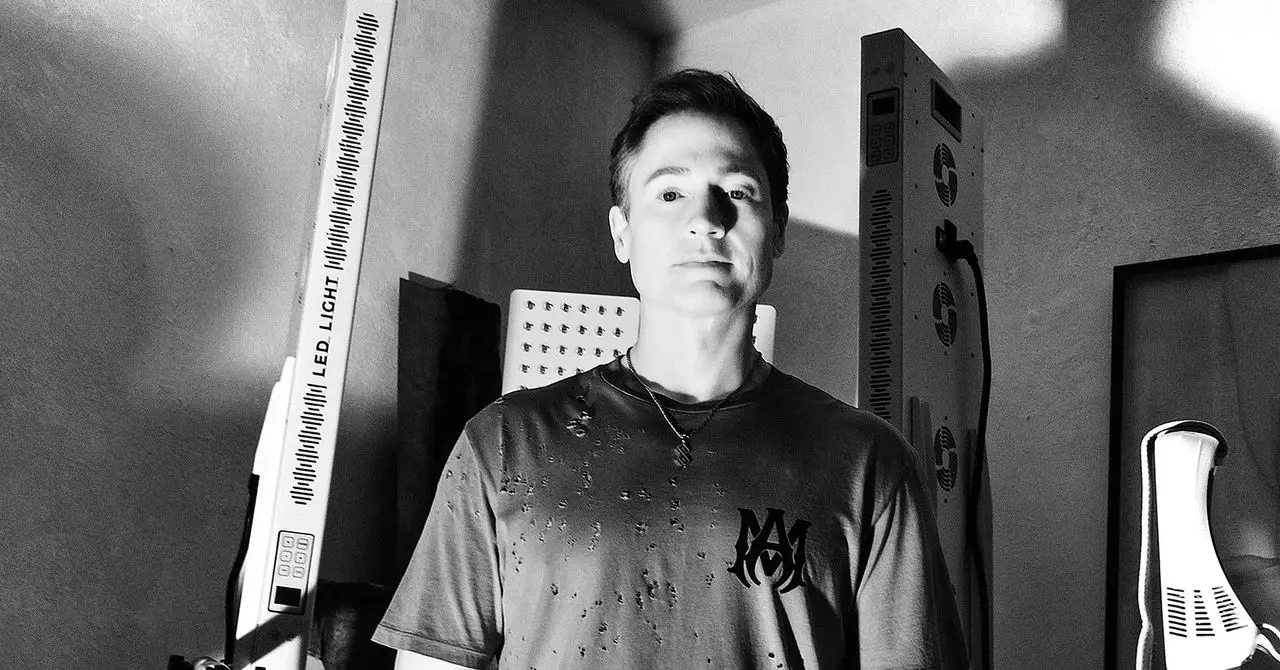In observing Bryan Johnson’s meticulously curated kitchen, one might initially be captivated by the pristine displays of fruit and the aura of health it exudes. Yet, beneath this polished veneer lies a stark contradiction: a single rotting orange amidst a basket of seemingly perfect produce. This dissonance is emblematic of the larger narrative Johnson represents—a relentless quest for perfection that borders on the absurd. His pristine lifestyle, crafted from a combination of wealth, scientific pursuits, and personal discipline, suggests an almost monastic devotion to longevity and self-optimization. However, the subtle signs of decay—molded fruit, hidden specimen cups—serve as a metaphor for the inevitable reality: mortality cannot be wholly eradicated, no matter how much effort, technology, or age-defying protocols are invested.
Johnson’s life epitomizes a paradox. On one hand, he has achieved the ultimate symbol of success—financial independence through the sale of Braintree, a pioneering tech company, and the freedom to reinvent himself. On the other hand, his obsession with conquering aging hints at an underlying fear: the fear of death, of losing control. The pristine home, often mistaken as an idyllic sanctuary, subtly reveals its imperfections upon closer inspection—reminding us that no realm, regardless of wealth or intellect, is beyond the reach of decay. This duality forces us to question whether our obsession with longevity is a genuine pursuit of vitality or simply a desperate grasp at permanence in an inherently transient universe.
The Cult of Performance and the Illusion of Control
Johnson’s regimen reflects a culture obsessed with self-optimization—dietary precision, constant monitoring of bodily functions, and relentless pursuit of health metrics. It’s a performance, one where the human body is not merely a vessel but a canvas on which science, discipline, and technological innovation are endlessly applied. This relentless focus on performance showcases humanity’s desire to control nature, to transcend biological limits, and to engineer a version of ourselves that defies aging. Yet, this obsession raises critical ethical and philosophical questions: At what cost does this pursuit come? Does it diminish the inherent beauty of aging and mortality, or does it elevate our understanding of what it means to be human?
Johnson’s public persona, amplified through media and social platforms, often highlights his physical prowess, idealized routines, and groundbreaking experiments. His body, claimed to be the healthiest on Earth, is his billboard—a testament to the power of science and discipline. But there’s a troubling undercurrent: the commodification of human health as spectacle. By broadcasting his regimen, Johnson transforms his body into a form of performance art, elevating himself above ordinary mortality and fostering a community that aspires to emulate this perfection. Such a stance is inherently problematic; it marginalizes those who lack access to advanced technology and reinforces societal divides rooted in privilege.
The Ethical Dilemmas of Immortality Fetishism
Johnson’s narrative also invites reflection on the darker side of the immortality obsession. His use of confidentiality agreements to shield his ventures reveals a desire to guard secrets—possibly from societal scrutiny or ethical pitfalls. His application of scientific procedures like plasma transfusions and intense data collection venture into ethically ambiguous territory, blurring the lines between pioneering medicine and playing God. In his fervor to extend life, Johnson unwittingly champions a form of elitism—an exclusive club where youth and health are commodities, not rights.
Furthermore, his engagement with artificial intelligence as a new holy grail complicates this picture. It suggests an evolution from biological optimization to technological enhancement, hinting at a future where humans may merge with AI to achieve immortality or transcendence. This speculative frontier raises vital questions: Are we prepared for the societal upheavals such technologies will bring? Will this pursuit create a divide between those who can afford perpetual life and those bound by natural limits? More fundamentally, it challenges our collective understanding of what it means to be human—does it lie in our biological essence, or in our capacity for innovation and resilience?
Johnson’s relentless drive to cheat death underscores a fundamental human trait: the desire for everlasting significance. The modern obsession with longevity is a mirror reflecting deeper anxieties about obsolescence and the fleeting nature of life. While technological advancements may promise more years, they also threaten to distort our perceptions of age, maturity, and mortality itself. The true power of these pursuits might not lie in extending life but in understanding—accepting and embracing the natural cycle of human existence while continuing to push the boundaries of possibility.
This journey towards eternal youth, ultimately, reveals our collective hope—and hubris. It ignites the enduring human instinct to conquer mortality, to leave a mark that defies time’s relentless march. Whether through molecular science, artificial intelligence, or sheer willpower, the pursuit persists. Yet, beneath the promise of eternity lies a sobering truth: the most profound aspects of our existence—our aging, our mortality, our imperfection—are what make life genuine, meaningful, and fundamentally human.

